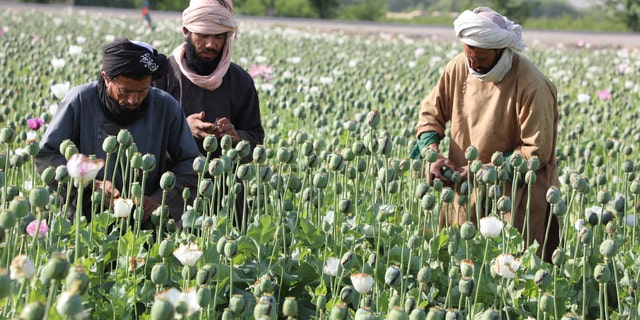Afghanistan under Taliban rule threatens the entire world — and not just through terrorism
This article is part of a Fox News Digital series examining the consequences of the U.S. military withdrawal from Afghanistan one year ago this week.
America and its allies face renewed terrorist threats and other dangers because of the Taliban’s year-long rule over Afghanistan, which has also harmed human rights in the region, two former ambassadors told Fox News.
The Taliban’s regime – through a mix of willingness and inability – has created a laundry list of threats to the region and Western democracy, according to the former ambassadors: a growth in terrorist organizations; decreased heroin prices; diminished human rights; the empowerment of Russia and China; and a looming refugee crisis.
“What you’re seeing with the Taliban in control of Afghanistan is increasingly a failed state,” a former U.S. ambassador-at-large for global women’s issues, Kelley Eckels Currie, told Fox News. “That is what has happened over the past year.”
HEROES OF KABUL: ‘ALL GOOD HERE,’ STAFF SGT. RYAN KNAUSS WROTE IN LAST MESSAGE TO MOM
“We’re going to continually be confronted with the consequences of this disorder, chaos and instability, misgovernance and all of these things,” Currie continued. “They’re going to come knocking on our doorstep in one form or another, whether it’s refugees or violent extremism.”
‘Roll out the red carpet’
Taliban rule has already allowed terrorist organizations to blossom in Afghanistan, and only more will grow, according to Currie and Nathan Sales, a former ambassador-at-large and coordinator for counterterrorism. They said these groups view the U.S. and its Western allies as top targets.
“Afghanistan is poised to become a real petri dish for terrorist organizations,” Sales told Fox News.
In some cases, like with al Qaeda, the Taliban actively allows terrorist organizations to expand, the former ambassadors said. But in others, like with ISIS-K, the regime is simply incapable of stopping their growth.
“The Taliban, for some of these groups, they will make common cause with them and roll out the red carpet,” Sales told Fox News. “In other cases, terrorist groups might find Afghanistan hospitable because the Taliban is unable to control its territory, is unable to bring pressure to bear on a group like ISIS, for instance.”
Either way, allowing terrorist groups to grow “inevitably will bleed out into the world in ways that are unpredictable and most likely dangerous and harmful to all of us,” Currie said.
It’s already clear that the Taliban has provided sanctuary to al Qaeda, allowing the extremist group to bolster its ranks once again, according to Sales.
“Unfortunately, the fact that al Qaeda’s number one leader was living in plain sight in a Taliban-provided safe house really goes to show that some of the most dire predictions about the relationship between al Qaeda and the Taliban were exactly right,” Sales said.

TALIBAN CLAIMS IT WAS UNAWARE AL QAEDA CHIEF AL-ZAWAHRI WAS IN AFGHANISTAN BEFORE US DRONE STRIKE
A CIA drone strike killed Ayman al-Zawahri, Usama bin Laden’s successor, earlier in August. The al Qaeda leader spent years in hiding away from the capital city, but, in recent months, began stepping onto a Kabul balcony each morning, with a Taliban faction fully aware, The Washington Post reported.
Sales applauded the drone strike but said “we also have to worry about what this portends for the future.”
“Under Taliban patronage, al Qaeda has been able to reconstitute and rebuild its networks,” Sales told Fox News. “That’s what it spent the last year doing, to the point where its leader felt safe living in a safe house associated with” a Taliban faction.
He also pointed out that al Qaeda, while living under Taliban rule, repeatedly struck the U.S. even before the 9/11 terrorist attacks.
“The more space, the more oxygen al Qaeda has in Afghanistan to rebuild its networks, to plot, to raise money, to radicalize, to recruit … the greater the risk that they will engage in terrorism against U.S. interests around the world and maybe even here at home,” Sales told Fox News.
But al Qaeda isn’t the only group that should concern the U.S., according to Sales.

ZAWAHRI’S KABUL DEATH RAISES QUESTIONS ABOUT AL QAEDA PRESENCE IN AFGHANISTAN AFTER US LEFT IT TO THE TALIBAN
“ISIS has a very active affiliate in Afghanistan that was responsible for a horrific suicide attack at the airport in Kabul during the U.S. evacuation that killed a number of American service members, as well as a number of innocent Afghans trying to flee Taliban rule.”
Thirteen U.S. service members and around 170 Afghan civilians were killed in the August 2021 attack by ISIS-Khorasan, or ISIS-K, at the Kabul airport.
‘An explosion of the opium and heroin trade’
Terrorism is just one threat stemming from Afghanistan. China and Russia will also leverage the Taliban, and poppy production will likely balloon and cause heroin prices to plummet around the world, according to Currie.
“Historically, when there is conflict and instability in Afghanistan … you see an explosion of the opium and heroin trade out of Afghanistan,” Currie told Fox News. “This has huge implications, not just for Europe, which is the primary market for that poppy, but also for the global market.”
Afghanistan provides about 80% of the world’s opium and heroin supplies despite America’s efforts to eradicate the trade, according to the United Nations. The Taliban outlawed cultivation in April, but it failed to eliminate the market during its previous reign and later turned to the crop for profit.
“If a flood into the market decreases the price in Europe, it’s going to have an impact on the price of opioids here in the United States,” Currie said. “When the price for heroin drops, it means that it is more widely available, more accessible.”

US WANTS TO END DEPENDENCE ON CHINA RARE EARTHS, YELLEN SAYS
Meanwhile, China immediately approached the Taliban after it seized power in Afghanistan – a nation rich with critical minerals used in a variety of electronics, including electric car batteries and cell phones.
“You have China going in and being very opportunistic in this situation to lock down rare earths supplies and mines and also willing to support the Taliban,” Currie told Fox News.
Moscow has similarly taken advantage of Taliban control.
Russia is “willing to support the Taliban for their own domestic political reasons,” Currie told Fox News. She said the country has used its seat on the United Nations Security Council to diplomatically protect Taliban interests.
“They’re looking for anyone who will not criticize them over the situation in Ukraine,” Currie told Fox News. “And the Taliban has certainly said absolutely nothing about Ukraine’s territorial integrity and continues to court Russia for support.”

TALIBAN CLOSES IN ON GASOLINE DEAL WITH RUSSIA
‘Worse humanitarian crises, more disorder, more problems’
Human rights under Taliban rule have also suffered, which will enable Afghanistan’s neighbors to have more authoritarian regimes, according to the former ambassadors, who are both now with the Vandenberg Coalition, a collection foreign policy experts.
Women could work, girls could go to school, and free speech and freedom of religion were respected before the Taliban took over, Sales said.
“The previous democratic government of Afghanistan was not perfect by any stretch of the imagination, but at least it was trying,” he told Fox News. “But all of that has been washed away by the Taliban wave that has swept across the country.”
That deterioration gives surrounding nations with human rights issues more breathing room, according to Currie.
“If you have a country that’s next door to you that is really at the bottom of the barrel on human rights, it, of course, is going to take some of the attention off of your less than attractive features when it comes to human rights,” Currie said.
“It certainly takes the pressure off of countries like Pakistan that do not have a good record on women’s rights, who do not have a good record on human rights overall, on tolerance for other religious groups, especially religious minorities, such as Christians,” Currie continued.

Between the Taliban’s authoritarian regime and its inability to provide for Afghan citizens, the country will eventually see a mass exodus of refugees, according to Currie.
The Taliban is “incapable of meeting the basic needs of the citizens of Afghanistan, which is going to precipitate worse humanitarian crises, more disorder, more problems in that country, leading to refugee flows, leading to, again, regional problems that we can ill afford to deal with,” Currie told Fox News.
“Allowing problems like this to fester has never worked out well for us,” Currie said.
Isabelle McDonnell contributed to the accompanying video.
Read the full article Here


